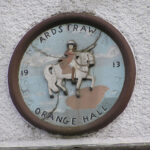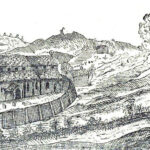3 June 1648: Disguised as a furniture remover, John Morris takes Pontefract castle for the Stuarts (and for himself)
Thomas Paulden. 1887. Pontefract Castle. The Sieges of Pontefract Castle, 1644-1648. Ed. Richard Holmes. Pontefract: Richard Holmes. Get it:
.Unedited excerpt
If an excerpt is used in the book, it will be shorter, edited and, where applicable, translated.
It may not be unacceptible to you, being a Yorkshireman, to know the most minute particulars of this enterprise, we being all Yorkshiremen who had a share in it…
In the year 1648, the first war being over, we, that had served the King in it, submitting to our common fate, lived quietly in the country, till we heard of an intended invasion by the Duke of Hamilton. Then we met frequently, and resolved to attempt the surprising this castle, of which Colonel [John] Cotterell was governor for the parliament, having under him a garrison of an hundred men, most of them quartered in the town of Pontefract, and in no apprehension of an enemy.
The design was laid by Colonel Morris (who in his youth had been page to the Earl of Strafford), my two brothers, who were captains of horse, and myself, captain of foot, and some others. We had then about three hundred foot, and fifty horse, of our old comrades privately listed.
We had secret correspondence with some in the castle; among the rest with a corporal, who promised, on a certain night [in May], to be upon the guard, and to set a sentinel, that would assist us, in scaling the walls by a ladder, which we had provided, and brought with us. But the corporal happened to be drunk at the hour appointed, and another sentinel was placed, where we intended to set our ladder, who fired upon us, and gave the alarm to the garrison. They appearing upon the walls, our men retired in haste, leaving the ladder in the ditch; whereby the next day they within knew that it was no false alarm, but that there had been a real attempt to surprise the castle.
They took not a man of us; our foot dispersed themselves in the country; and half of our horse marched to Sir Marmaduke Langdale, who had then taken Berwick and Carlisle. The rest being twenty or thirty horse, kept in the woods, while we sent spies into the castle, and found that our confederates within were not discovered, nor our design betrayed, but only failed by the corporal’s being drunk.
The ladder being found the next morning, made the governor call the soldiers out the town, to lodge in the castle: in order to which, he sent his warrants into the country for beds to be brought in by a day appointed [3 June].
We had notice of it, and made use of the occasion. With the beds came Colonel Morris, and Captain William Paulden, like country gentlemen, with swords by their sides; and about nine persons more, dressed like plain countrymen, and constables, to guard the beds, but armed privately with pocket-pistols and daggers.
Upon their approach, the draw-bridge was let down, and the gates opened by our confederates within, and Colonel Morris, and those who were with him, entered the castle. The main-guard was just within the gate, where our company threw down the beds, and gave a crown to some soldiers, bidding them fetch ale, to make the rest of the guard drink: and as soon as they were gone out of the gate they drew up the draw-bridge, and secured the rest of the guards, forcing them into a dungeon hard by, to which they went down by about thirty stairs; and it was a place that would hold two or three hundred men.
Then Captain William Paulden made one of the prisoners show him the way to the governor’s lodging, where he found him newly laid down upon his bed, with his clothes on, and his sword, being a long tuck, lying by him. The captain told him the castle was the king’s, and he was his prisoner; but he, without answering any thing, started up, and made a thrust at the captain, and defended himself very bravely, till being sore wounded, his head and arm cut in several places, he made another full and desperate push at the captain, and broke his tuck against the bed-post; and then asked quarter, which my brother granted; and he, for the present, was put down, among his own soldiers, into the dungeon.
Notice was immediately sent to me, lying hard by, of the taking of the castle; upon which I marched thither with about thirty horse, and it being market-day, we furnished ourselves with all manner of provisions from the town.
There came speedily to us, in small parties, so many of our old fellow-soldiers, that our garrison was at last increased to five hundred men, which at the rendering of the castle afterwards, were reduced to one hundred and forty.
We found in the castle a good quantity of salt and malt, with four thousand arms, and a good store of ammunition, some cannon, and two mortar-pieces. We expected a siege very suddenly, and got what provisions of corn, and cattle, we could, out of the country.
Particularly in one sally, having notice that there were at Knottingley, 3 miles from the castle, three hundred head of cattle, bought up in the north, going into the south, under a guard of two troops of horse, we marched out at night with thirty horse, and half a dozen foot, with half-pikes to drive the cattle. We faced the troops that guarded them, while our foot drove the herd towards the castle; then we followed, and kept betwixt them and danger, the enemy not daring to charge us, and so we came all safe with our purchase into the castle. This, and other provision, we got in by several parties almost every night, enabled us to keep the castle above nine months, though we had not one month’s provision when we were first beleaguered.
Comment
Comment
Pontefract finally fell to Cromwell, and Morris – not without further escapades – was taken. His explanation as to why he should not die (he did, gallantly) includes the following gem:
John Morris, now prisoner in York Castle for high treason, being examined touching the surprisal of the castle and garrison of Pontefract in June last was a year, and whether he commanded the party who surprised and took the said castle, he answereth that he did not surprise the said castle and garrison, for it was delivered to him, the gates being opened to him, and he going into the same without resistance; and he was from thenceforth governor of the same, as his commission from the Prince of Wales, which he hath to shew, will expresse at large, and he did there command in chief the soldiers of the said garrison according to this said commission, for all the time he held the said castle against the forces of the Parliament (Raine 1861).
Something to say? Get in touch
Similar
 23 January 1643: Thomas Fairfax, the Rider of the White Horse, captures Leeds from the Beast with the help of Psalm 68
23 January 1643: Thomas Fairfax, the Rider of the White Horse, captures Leeds from the Beast with the help of Psalm 68 28 August 1661: The York assizes hear of a fatal military brawl at a Malton inn, involving rouges (roundheads), Charles II’s pardon for crimes during the interregnum, and flatulence
28 August 1661: The York assizes hear of a fatal military brawl at a Malton inn, involving rouges (roundheads), Charles II’s pardon for crimes during the interregnum, and flatulence
Comment
Comment
In his memoirs his and Robert Gee’s hiding place seems to have shifted to the steeple of the church (Shawe 1824).
Something to say? Get in touch
Search
Donate
Music & books
Place-People-Play: Childcare (and the Kazookestra) on the Headingley/Weetwood borders next to Meanwood Park.
Music from and about Yorkshire by Leeds's Singing Organ-Grinder.




 Bluesky
Bluesky Extwitter
Extwitter